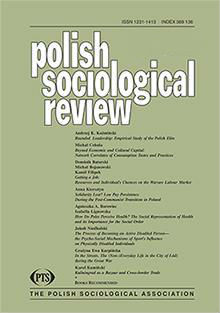National Context, Parental Socialization, and Religious Beliefin 38 Nations as of 2008:The End of National Exceptionalism?
National Context, Parental Socialization, and Religious Beliefin 38 Nations as of 2008:The End of National Exceptionalism?
Author(s): Jonathan KelleySubject(s): Social Sciences
Published by: Polskie Towarzystwo Socjologiczne
Keywords: Religion; religious beliefs; devout; secularization; parental socialization; cross-cultural; national context; US exceptionalism; Poland; Communism
Summary/Abstract: Late in the 20th century, research found that (1) people living in religious nations will, in proportion to the religiosity of their fellow-citizens, acquire more orthodox beliefs than otherwise similar people living in secular nations; (2a) in relatively secular nations, family religiosity strongly shapes children’s religious beliefs, while the influence of national religious context is small; (2b) in relatively religious nations family religiosity, although important, has less effect on children’s beliefs than does national context; (3) the USA was exceptional, being more religious than other nations at its high level of development, and (4) formerly Communist nations in East-Central Europe were also exceptional, being less devout than Western nations. This paper tests whether these patterns still hold in more recent times. Almost two decades later, the effects of family and national religiosity still hold, and strongly so. But few nations are any longer noticeably exceptional: After adjusting for demographic differences, parents’ devoutness, and the strong impact of national context, the USA is only fractionally more devout than comparable nations. East-Central Europe now hardly differs from the West. Poland—as devout as the USA without adjustments—is fractionally less devout than comparable nations after these adjustments. Data are from 38 nations and over 50000 respondents, analyzed by multi-level methods.
Journal: Polish Sociological Review
- Issue Year: 191/2015
- Issue No: 3
- Page Range: 295-314
- Page Count: 19

